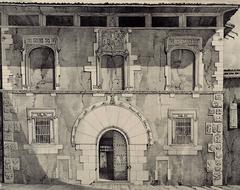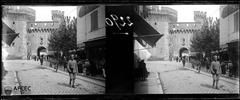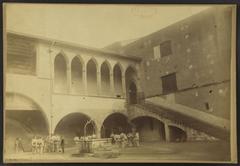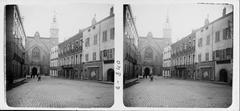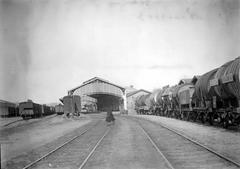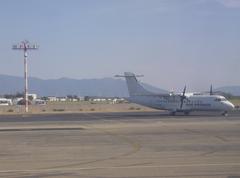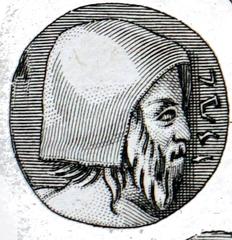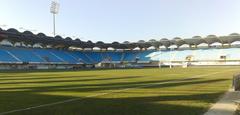
Stade Jean-Laffon Visiting Hours, Tickets, and Perpignan Historical Sites Guide
Date: 04/07/2025
Introduction to Stade Jean-Laffon and its Significance in Perpignan
Stade Jean-Laffon, located in the vibrant Vernet district of Perpignan, southern France, is a storied sports venue that has played a pivotal role in the region’s rugby and football legacy since its inception in the early 1930s. Originally established to provide a home for the newly formed rugby league club XIII Catalan, the stadium has since grown into a hub of cultural and sporting life, reflecting both the fierce rivalries and the deep-rooted traditions of French Catalonia.
Beyond its function as a sports ground, Stade Jean-Laffon stands as a symbol of local identity, community unity, and resilience. From hosting historic rugby clashes and wartime transformations to celebrating Catalan customs like the cargolade feast, the stadium is intertwined with Perpignan’s collective memory. Today, it welcomes visitors seeking to experience regional sporting history, participate in community activities, or explore nearby landmarks such as the Palais des Rois de Majorque and Le Castillet.
This comprehensive guide provides detailed information on Stade Jean-Laffon’s history, architecture, visiting hours, ticketing, accessibility, facilities, and its enduring cultural legacy. It also features practical tips, answers to frequently asked questions, and recommendations for making the most of your visit to Perpignan’s historical sites.
Table of Contents
- Origins and Early Development
- The Battle for Sporting Supremacy
- Wartime Transformations and Post-War Era
- Architectural and Infrastructural Evolution
- Decline and Transformation
- Stadium Layout, Capacity, and Facilities
- Visiting Stade Jean-Laffon: Hours, Tickets, and Accessibility
- Role in Perpignan’s Sporting Life
- Cultural Significance and Community Engagement
- Nearby Attractions and Visitor Tips
- Frequently Asked Questions (FAQ)
- Conclusion and Recommendations
- References
Origins and Early Development
Stade Jean-Laffon’s story begins in the 1930s, a transformative era for French rugby. The stadium was constructed to serve as the home ground for XIII Catalan, a club established in 1934 to champion rugby league (rugby à XIII) in a city dominated by rugby union fervor. Before the stadium was built, the club practiced outside Perpignan at Château de l’Esparrou in Canet. Recognizing the need for a dedicated venue, XIII Catalan developed the stadium in the Vernet district, hosting its inaugural major match against the English team Salford on November 2, 1934 (surlatouche.fr).
The Battle for Sporting Supremacy
Stade Jean-Laffon quickly became a stage for the rivalry between Perpignan’s rugby union establishment, led by USAP (Union Sportive des Arlequins de Perpignan), and the rugby league newcomers. The mid-1930s saw heated disputes over control of local sporting grounds, culminating in dramatic events such as the lock-breaking reclamation of the stadium by USAP leaders during the 1936–1937 season. These episodes, often celebrated with traditional cargolade feasts, underscored the stadium’s status as a focal point of community identity and sporting passion.
Wartime Transformations and Post-War Era
The outbreak of World War II led to significant changes in the stadium’s use. Rugby league was banned, and XIII Catalan was reconstituted as XV Catalan (rugby union), later becoming RC Catalan. The stadium reopened in 1940 for rugby union matches, and in 1942, RC Catalan secured a 30-year lease, initiating redevelopment plans. Meanwhile, USAP moved to Stade Aimé Giral, which benefitted from state-sponsored upgrades (surlatouche.fr).
Architectural and Infrastructural Evolution
Through the 1940s and beyond, Stade Jean-Laffon underwent several enhancements under RC Catalan’s management. Improvements included stands, pitch quality, and basic spectator facilities, reflecting its importance to local sports and the Vernet neighborhood’s urban landscape.
Decline and Transformation
Following the construction of Stade Gilbert Brutus in the early 1960s, which better accommodated the city’s growing rugby league ambitions, Stade Jean-Laffon’s prominence diminished. Nevertheless, it retained its status as a community sports venue, with its legacy deeply woven into Perpignan’s sporting narrative.
Stadium Layout, Capacity, and Facilities
Stade Jean-Laffon is situated at Avenue Paul Dejean, 66000 Perpignan (csmpq.fr). Originally, it could accommodate over 18,000 spectators for major events, including the 1950 French Rugby League Championship final (fr-academic.com). Today, it officially seats around 7,050, with one main stand remaining in regular use.
The stadium features:
- A natural grass pitch (approx. 7,062 m²)
- A 400-meter, 8-lane athletics track
- Multi-use field for rugby and football
- Four changing rooms with showers
- A weight training room
- Covered seating in the main stand
- Basic amenities such as restrooms and a refreshment kiosk (csmpq.fr, sportenfrance.fr)
The pitch is widely praised for its quality and versatility, serving local clubs, youth teams, and school competitions (webvilles.net).
Visiting Stade Jean-Laffon: Hours, Tickets, and Accessibility
Visiting Hours:
The stadium is generally open during daylight hours for training sessions, matches, and events. For unscheduled visits or tours, it is best to confirm opening hours with the stadium directly at +33 7 50 52 02 95 or through local club websites (csmpq.fr).
Tickets:
Entry is often free for regular training sessions and local matches. For tournaments and special events, tickets are available on-site or via the hosting club’s platforms. Prices are affordable, reflecting the stadium’s community focus.
Accessibility:
Stade Jean-Laffon is accessible to visitors with reduced mobility, featuring wheelchair-friendly entrances and dedicated parking spaces (sportenfrance.fr). General parking for approximately 50 vehicles is available on-site.
Guided Tours:
Guided tours are not regularly offered but may be arranged during special events. For group visits and historical insights, contact the stadium or local sports associations in advance.
Role in Perpignan’s Sporting Life
Grassroots Development and Local Clubs
Stade Jean-Laffon is a cornerstone for amateur and youth sports in Perpignan, hosting OC Perpignan football club and supporting rugby and athletics. The stadium’s facilities nurture local talent, providing a launchpad for young athletes (csmpq.fr).
Regional Tournaments and Community Events
The venue regularly hosts regional tournaments, inter-school competitions, and community gatherings. Events such as charity matches and local festivals foster social inclusion and community spirit (France-Voyage).
Cultural Significance and Community Engagement
Stade Jean-Laffon has always been more than a sports arena—it is a living symbol of Perpignan’s resilience and Catalan heritage. The stadium’s history is closely linked with local traditions, including the cargolade feast, and memorials such as the monument to Jean Laffon and AS Perpignan players lost in World War I (wikimonde.com). Community engagement is further strengthened through charity events, festivals, and cultural celebrations.
Nearby Attractions and Visitor Tips
Key Nearby Sites:
- Palais des Rois de Majorque: A medieval palace offering panoramic views of Perpignan.
- Le Castillet: Historic city gate and museum highlighting Catalan culture.
- Stade Aimé Giral and Stade Gilbert-Brutus: Key venues in Perpignan’s rugby history.
Travel Tips:
- Use local bus lines 1 and 4 for easy access.
- Arrive early to enjoy the pre-event atmosphere.
- Bring water and sun protection, as the main stand is uncovered.
- Explore local restaurants and markets after your visit (ville-data.com).
Frequently Asked Questions (FAQ)
What are the stadium’s visiting hours?
Open during daylight and event hours; confirm with the stadium for unscheduled visits.
Are tickets required?
Regular sessions are typically free; tickets for special events can be bought on-site or via club websites.
Is the stadium accessible?
Yes, with wheelchair access and designated parking.
Are there guided tours?
Not regularly, but possible during special events or by arrangement.
How do I get there?
Served by bus lines 1 and 4, with parking and bike access available.
Conclusion and Recommendations
Stade Jean-Laffon is a vibrant emblem of Perpignan’s sporting and cultural heritage. Its rich history, community-centered events, and accessibility make it a must-visit site for sports fans and cultural explorers alike. To get the most out of your visit:
- Check event schedules and ticket availability in advance.
- Visit nearby historical sites to enrich your experience.
- Download the Audiala app and follow local club and tourism social media for the latest updates.
For a genuine taste of Perpignan’s legacy—on and off the field—add Stade Jean-Laffon to your itinerary.
References
- Guerre Brutus Laborde - Naissance du XIII à Perpignan, Surlatouche.fr
- Stade Jean-Laffon, Csmpq.fr
- Stade Jean-Laffon (Perpignan), Webvilles.net
- Stade Jean-Laffon, Sportenfrance.fr
- Stade Jean-Laffon, Wikimonde.com
- Perpignan Commune Events, France-Voyage.com
- Ville-data.com


